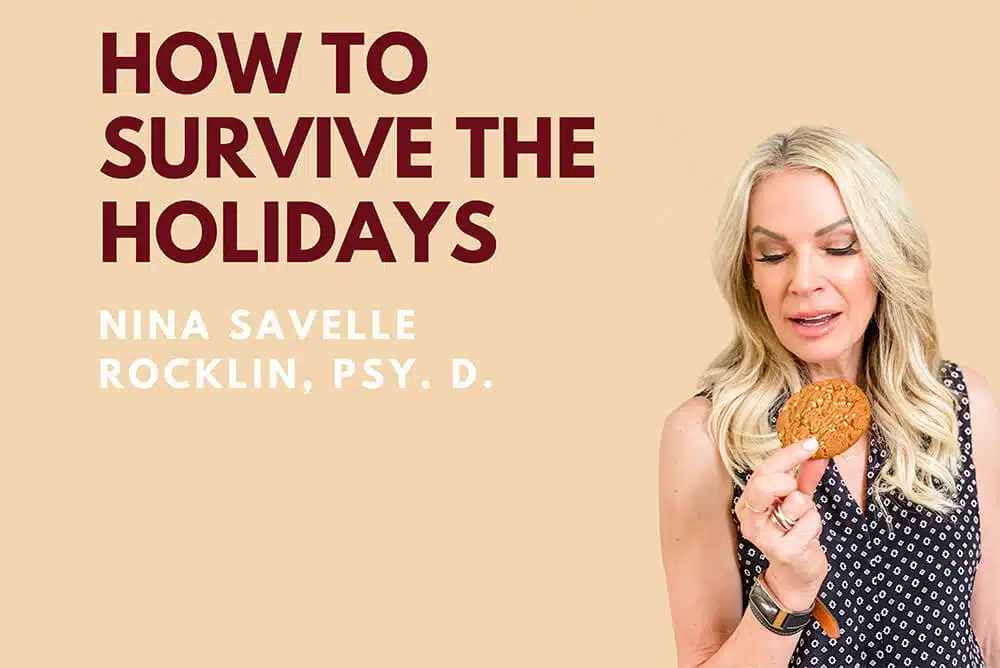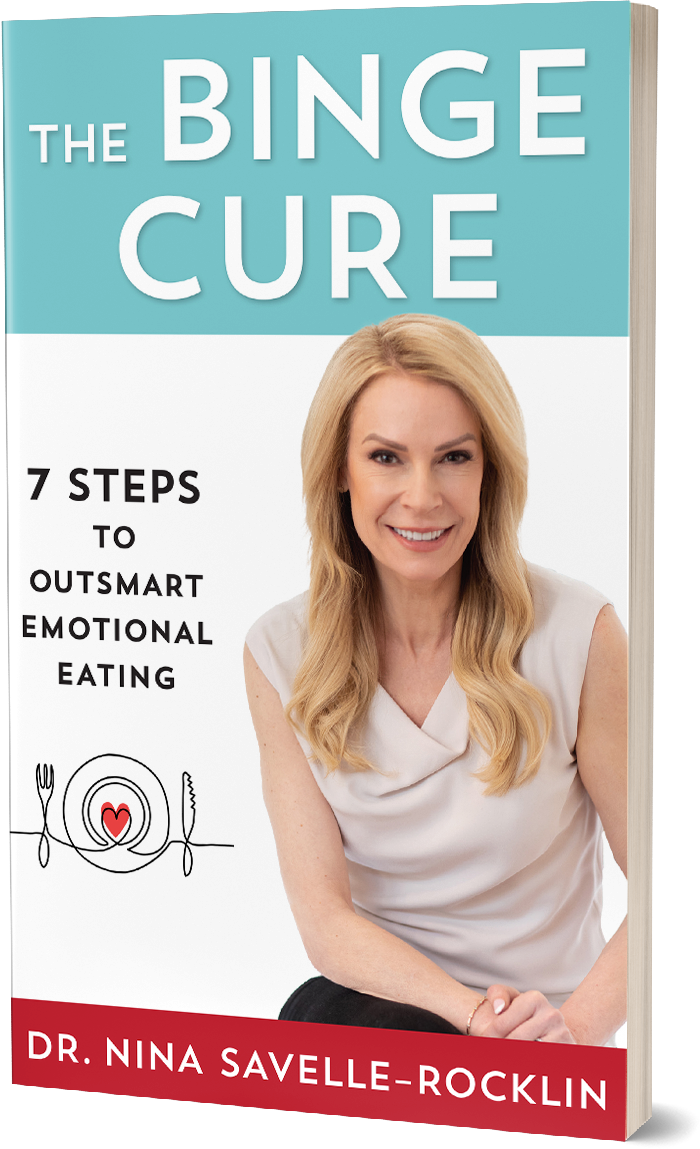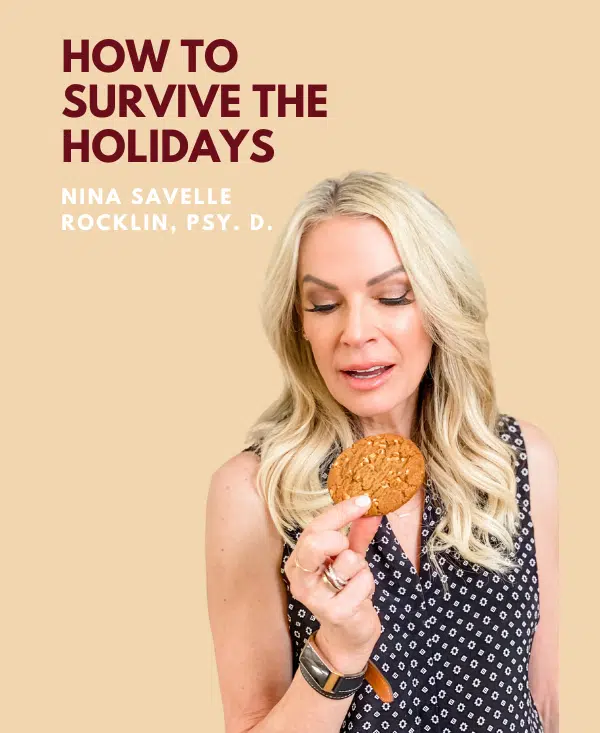Dr. Nina Savelle-Rocklin
7 Power Moves for a Stress-Free Holiday
Table of Contents
- #1 Skip the Diet Drama
- #2 Decode Your Family Dynamics
- #3 – Set Boundaries to Protect Your Emotional Well-Being
- #4 Navigate Body Shaming for a Stress-Free Holiday
- #5 Enjoy Your Meal
- #6 Plan Ahead for Serenity
- #7 Cultivate Gratitude and Giving
- Frequently Asked Questionts:
Welcome to this guide on 7 Power Moves for a Stress-Free Holiday, which explores ways to make your festive season more joyful and less stressful. Feeling the weight of the holiday season? Worried about food, family dynamics, and festivities? Dive into these seven power moves to breeze through the holidays without worrying about food or your weight.

#1 Skip the Diet Drama
Our first power move towards a stress-free holiday involves rethinking how we approach holiday eating.
The holiday season is filled with delicious temptations – sugary cookies, rich appetizers, and decadent desserts. For many people, this brings up guilt and stress around food.
This is especially true for those dealing with binge eating disorder. Thinking about food causes guilt, shame, frustration and. hopelessness. But with a few mindset shifts, you can enjoy holiday indulgences without losing control over food or feeling bad about what you eat.
The solution is to stop dieting. Weight loss diets lead to bingeing because they create a cycle of restriction and deprivation. When we restrict ourselves from certain foods or follow strict diet rules, it can trigger feelings of deprivation and a sense of being deprived of pleasure. This leads to cravings and a preoccupation with those forbidden foods, making it more likely for us to give in and binge when we finally, and inevitably, allow ourselves to have those foods.
The restriction mindset also causes a loss of control around food, as we may feel a sense of urgency to eat as much as we can before the next diet starts.
Dieting promotes an all or nothing mentality, where certain foods are labeled as good or bad. This dichotomous thinking can create a sense of guilt and shame when we indulge in foods that are considered off-limits.
When we feel guilt and shame around food but don’t have a way of reassuring and comforting ourselves, we end up eating for comfort and distraction, creating a vicious cycle. This year, try a different approach by allowing yourself to indulge in holiday goodies without spiraling into guilt or loss of control. Here’s how to do it:
First, detach feelings of shame or judgment from your food choices. Remind yourself that no foods are inherently good or bad. And, you’re not “good” if you eat salad and “bad” if you eat cookies. Give yourself unconditional permission to enjoy special occasion treats. This prevents those restrictive rules that lead to rebellion and overdoing it. When you challenge diet mentality, you’re less likely to feel out of control around treats.
Listen to your body’s signals of fullness and satisfaction. Savor a cookie or two, then check in to see if you really want more. Pause partway through a meal to tune into your hunger levels. Slowing down can help prevent overdoing it.
Counterbalance heavier holiday foods by staying active and emphasizing nutrition at other meals. Remember that “the holidays” really only involve a limited number of meals. Make time for movement each day, drink plenty of water, and add in lighter fruits, proteins, and veggies.
At the end of the day, remind yourself that your worth isn’t defined by what you eat or how much you weigh. Have compassion for yourself and focus on all the meaningful reasons for the season.
With a balanced approach to food, there are so many ways to foster joy and wellbeing without feeling guilty about food during this holiday season. Challenging diet mentality means you can eventually learn to enjoy food without worrying about losing control.
#2 Decode Your Family Dynamics
Decoding your family dynamics is a key step towards ensuring your holiday season is as stress-free as possible.
The holidays often reawaken complicated emotions and unconscious conflicts, which are so uncomfortable you may use food to cope. Luckily, it is possible to form positive associations at this time of year.
Start by reflecting on when binge patterns surface during the holidays. Do certain family interactions trigger you?
Petra’s Story:
Petra recognized that certain family interactions triggered intense emotions. Sometimes, it was the judgment of an aunt, or the high-pressure environment that came with the expectation to maintain familial harmony. These situations would cause Petra to seek comfort and momentary escape through food.
What’s important to remember is that these triggers are not the problem. Rather, it’s how we perceive and react to these triggers that can cause stress. This means that you have the power to change how these situations affect you.
These stressors often stem from deep-rooted patterns and expectations. By becoming aware of these patterns, we can learn to set boundaries and handle these situations with more grace and less stress.
Family dynamics can become problematic during the holidays due to a variety of reasons. One common issue is unresolved conflicts or tensions within the family. These unresolved issues can resurface during holiday gatherings, leading to arguments or strained relationships. For example, past disagreements or hurtful comments may be brought up, causing tension and discomfort for everyone involved.
Another problematic family dynamic during the holidays is the pressure to conform to certain expectations or roles. Family members may feel obligated to fulfill specific roles or traditions, even if they don’t align with their own desires or values. This can lead to feelings of resentment or frustration, as individuals may feel like they are not being heard or respected in their own family.
Additionally, the holiday season can bring together family members who have different beliefs, values, or lifestyles. These differences can sometimes lead to clashes or disagreements, especially when it comes to topics such as religion, politics, or parenting styles. It can be challenging to navigate these differences while maintaining a peaceful and harmonious atmosphere during holiday gatherings.
Overall, it’s important to recognize that every family has its own unique dynamics, and what may be problematic for one family may not be for another. However, by being aware of potential issues and proactively addressing them, families can work towards creating a more harmonious and enjoyable holiday season.
Here are some common dynamics:
- The overbearing relative who bosses everyone around and imposes their way of doing things.
- Siblings bickering over politics, lifestyle choices, or dug-up childhood conflicts.
- Judging in-laws for their differences in traditions, values, or parenting styles.
- Parents treating adult children like they are still kids and being overly critical.
- Relatives being invasive with personal questions about jobs, relationships, or kids.
- Competitiveness over who hosts, gives the best gifts, cooks the best food, has the best care.
- Guilt-tripping and shaming around food, money, career status, being single.
- Exclusion or meanness toward certain family members for ongoing grudges.
- Lack of boundaries around inappropriate humor, controversial topics, or advice.
- Pressure to spend time with toxic relatives for the sake of “family togetherness.”
- Disappointment when reality doesn’t match the Norman Rockwell ideal for the holidays.
What worked for Petra is what will work for you. The key is managing expectations, setting boundaries, making self-care a priority, and giving yourself permission to opt-out of dysfunctional situations as needed.
#3 – Set Boundaries to Protect Your Emotional Well-Being
We’ve all felt it: the tension of holiday stress. Do you dread looking at your kitchen, anxious at the thought of holiday feasts packed with calorie-dense delights? Does your chest tighten thinking about navigating delicate family dynamics?
If you’re weighed down by worry about the festivities and food that should bring joy, I have good news for you: It is possible to create a different experience. And that starts with boundaries.
Setting boundaries with family members over the holidays can be challenging, but it is an important part of maintaining your emotional well-being. One approach is to have a clear understanding of your own needs and limits before engaging with your family.
Reflect on what behaviors or interactions trigger stress or discomfort for you. This self-awareness will help you establish boundaries that are specific to your situation and personal preferences.
Clearly express your needs and limits to your family members, using I statements to avoid sounding accusatory.
For example, instead of saying, “You always criticize my choices,” say, “I feel hurt when my choices are criticized.”
Be firm and consistent, and avoid apologizing or justifying yourself. Setting boundaries is about taking care of yourself, and you have the right to do so.
Be prepared for potential resistance or pushback from family members. Some may not understand or respect your boundaries. Stay focused and assertive, and reiterate your boundaries if necessary.
It’s helpful to have a support system in place, such as a trusted friend or partner, who can provide emotional support and encouragement during challenging interactions with family members.
Last, be willing to compromise when appropriate. Setting boundaries doesn’t mean completely shutting down or isolating yourself from your family. It means finding a balance that respects your needs while still maintaining relationships.
Be open to finding common ground and seeking solutions that work for everyone involved. Remember, the goal is to create a harmonious and stress-free holiday environment for yourself and your family.
By setting boundaries with family members over the holidays, you are prioritizing your emotional well-being and creating a space where you can fully enjoy the festivities. Prioritizing your needs and taking care of yourself is self-care, not selfish.
Steps to set boundaries:
- Communicate your needs: Clearly express your limits and expectations to your family and friends. Let them know what you are comfortable with and what you are not. Example: “I appreciate the invitation, but I won’t be able to attend the holiday party this year. I need some time to recharge and take care of myself.”
- Prioritize self-care: Make self-care a priority. Take breaks when you need them, whether it’s stepping away from a crowded gathering or taking time for yourself to relax and rejuvenate. Example: “I need some alone time this afternoon to recharge. I’ll join the family gathering later in the evening.”
- Learn to say ‘no’: It’s okay to decline invitations or activities that don’t align with your well-being. Remember, you don’t have to do everything and please everyone. Example: “Thank you for thinking of me, but I won’t be able to help with organizing the holiday event this year. I have other commitments that need my attention.”
- Set time limits: If you find certain interactions or events draining, set a specific time limit for your participation. This allows you to engage without feeling overwhelmed.Example: “I can join the family dinner for a couple of hours, but then I need to head home to get some rest.”
#4 Navigate Body Shaming for a Stress-Free Holiday
Navigating body shaming is another important aspect of maintaining a stress-free holiday atmosphere.
The holidays often invite unwanted comments from family about weight gain, food choices, or your appearance. These body shaming moments can be hurtful but there are graceful ways to respond. Here are three effective approaches: deflecting, setting boundaries, and using humor.
Deflect body shaming by subtly redirecting the conversation elsewhere. Say you’ve been busy and haven’t exercised much or that the food just tastes too good to resist. Deflection avoids engaging directly with hurtful remarks. It’s useful for shifting topics when you don’t want confrontation.
State your boundaries by saying you’d prefer not to discuss your body, food choices or weight. Be clear these topics are off limits for you. This leaves no ambiguity and is useful for stopping unwanted comments clearly and immediately.
Using humor or jokes to challenge negative body talk diminishes the power of shaming comments by flipping the script. It’s useful if you want to avoid confrontation.
Having several go-to responses in your toolbox makes handling body shaming much easier. You can be prepared to redirect or shut down insensitive comments gracefully. With practice, you’ll gain confidence to deal with uncomfortable moments while keeping the holiday spirit intact. Here are more examples:
“You’ve really packed on the pounds since last year!”
Deflect by completely changing the subject, which means responding with a non-sequitur such as, “Got any travel plans next year?”
Setting boundaries sounds like, “I’d rather not discuss my body, let’s talk about something else.”
If you want to use humor, you can say, “Well, that just means there’s more of me to love!”
“Are you sure you need another serving?”
Nobody in the history of time has ever responded to this by saying, “Thank you for bringing that to my attention. I changed my mind.”
Here are some ways to respond to this kind of shaming question:
Deflection response:
“I’m looking for a new book to read. Any recommendations?”
Boundaries response:
“Please don’t comment on what or how much I’m eating.”
Humor response:
“Why yes, I’m quite sure I do want another serving, but thanks for checking in with me”
“You’ll have to double your workouts after all this feasting!”
Deflection response:
“Have you seen any good shows or movies, lately?”
Boundaries response:
“Let’s not talk about that topic,” or, “”Actually, I’m focused more on enjoying time with family than worrying about calories.”
Humor response:
“You’re really, really focused on me. Laser focused and giving me all your attention. I’m flattered!”
With practice, deflecting, setting boundaries, or using humor can help handle body shaming gracefully. It may feel uncomfortable at first, but it is essential for maintaining your well-being during the holiday season.
#5 Enjoy Your Meal
Enjoying your meal is vital for a stress-free holiday, particularly for those navigating food-related anxieties.
For those who struggle with binge eating, the holidays often become negatively associated with overindulgence and guilt. But you can take back this season by purposely forming new, positive associations.
One way to enjoy a holiday meal when you’re anxious about your body and food is to practice mindful eating. Instead of focusing on the negative thoughts or judgments about your body, shift your attention to the sensory experience of eating.
Pay attention to the flavors, textures, and aromas of the food. Take small bites and savor each one. By being present in the moment and fully experiencing the meal, you can cultivate a more positive and enjoyable relationship with food.
Instead of viewing holiday meals as opportunities to overindulge or as a source of anxiety, think of them as special occasions to savor and enjoy. Allow yourself to have your favorite holiday treats without guilt or restriction. Usually, that means you’ll end up eating less, rather than more.
One meal or one day of indulgence will not significantly impact your overall health or body. By adopting a more balanced and flexible approach to eating, you can reduce anxiety and fully embrace the joy of holiday meals.
Another strategy is to focus on the social aspect of holiday meals. Instead of fixating on your body and food, have meaningful conversations and connections with your loved ones. Shift your attention away from your anxieties and towards the joy of spending time with family and friends. By immersing yourself in the holiday spirit and the company of others, you can create a more positive and fulfilling experience around holiday meals.
Petra’s Story:
When Petra began her journey towards self-care and emotional well-being, she noticed that certain aspects of the holiday season would trigger unhealthy eating habits. She told herself she couldn’t eat any pie or cookies, but inevitably she gave in. That one moment of surrender led to days of binge eating and guilt that lasted longer than the holidays.
On one occasion, Petra experienced a deep craving for pumpkin pie. Recognizing this as a potential trigger to binge eating, she reinvented her relationship with this dish.
Instead of viewing it as a guilty indulgence, she decided to relish it as a symbol of the holiday spirit – a treat to be enjoyed. She gave herself permission to have pie and to enjoy it, eating it slowly and savoring it.
When she gave herself that gift of eliminating deprivation and allowing herself to have forbidden foods, the urge to binge disappeared. This year, she’s confident about getting through the holidays without worrying about food or gaining weight.
Once you’ve identified the foods that cause you anxiety, remind yourself that you have the power to change your response to them. If a particular food item is a trigger, try reframing your relationship with it. Enjoy it consciously and without guilt.
With mindset shifts and proactive steps, you can stop food anxiety forever and get to a place of celebrating in a healthier, happier way.
#6 Plan Ahead for Serenity
Planning ahead is a pivotal step in ensuring a stress-free holiday, letting you focus on the joy rather than the chaos of the season.
The holiday season often comes loaded with expectations of magical Hallmark movie moments. Images of perfect gatherings around a candlelit table, cookies baked just like Grandma used to make, and carolers spreading cheer outside your door.
But let’s get real—is this really what happens for most of us during the holidays? More often, realities look like:
- The turkey taking twice as long to cook so dinner is late
- Squabbles between family members over politics or lifestyle differences
- Burnt cookies because you overlooked them in the oven
- Credit card bills from all the gifts and travel expenses
As much as we may try, the odds of pulling off a perfect holiday season are slim. And you know what? That’s okay.
This year, give yourself permission to let go of “holiday perfectionism” and focus on what really matters. Here are some ways to approach the season with more presence and joy, and less unnecessary stress:
Plan, But Don’t Micromanage: Some level of planning makes sense—you want to have gifts, book travel, mail cards, etc. But don’t let the details overshadow the purpose. Overplanning leads to disappointment when (not if) things go off-script.
Instead, focus on intentions rather than perfection. Your goal might be to gather with your multigenerational family and enjoy time together. The turkey might be dry or Uncle Jim will argue politics, but those things won’t ruin your purpose.
Protect Your Energy: Holidays often involve nonstop socializing that can be exhausting. Don’t feel guilty for skipping events or needing alone time to recharge. Take time for self-care and say no to obligations that don’t serve you. Prioritize quality connections over quantity.
Let Go of Expectations: No family holiday is just like the movies. Accept each person as they are instead of wishing they would act differently. Release fears that this year “won’t be as good” as holidays past. Appreciate each moment as it comes.
Focus on the Present: Savor the people, food, music, and traditions. Don’t just go through the motions or wish it was over. Take mental snapshots. Share stories, laughs, and comfort. Practice mindfulness to fully experience each gathering.
Make a budget: Part of planning is dealing with the financial part of the holidays. Dealing with financial stress over the holidays can be challenging, but there are strategies you can implement to alleviate some of the pressure.
Creating a budget means determining how much you can afford to spend on gifts, decorations, and other holiday expenses, and avoid going overboard. Consider setting limits on gift exchanges with family and friends to keep costs in check.
You can also explore alternative gift options such as homemade presents or organizing a gift exchange where everyone contributes a small amount. By being mindful of your spending and finding creative ways to give, you can reduce financial stress during the holiday season.
Instead of focusing on expensive gifts, prioritize spending quality time with loved ones. Plan activities that don’t require a significant financial investment, such as having a movie night at home, going for a hike, or organizing a potluck dinner.
Remember, the true meaning of the holidays is about creating memories and fostering connections, not about how much money you spend.
The holidays are meant to be enjoyed, not endured. By letting go of self-imposed pressures, you can more fully cherish the season. Rather than seeking perfection, find meaning. Create traditions that speak to your values. Reflect on the year’s blessings. Tune out the noise, and treasure the people near to your heart.
#7 Cultivate Gratitude and Giving
Cultivating gratitude and giving is not just a noble act; it’s a powerful move to enrich your stress-free holiday experience.
Gratitude has the power to transform your holiday experience, even if you struggle with food and emotional eating. When we focus on gratitude, we shift our attention away from negative thoughts and emotions surrounding food.
Instead of fixating on what we can’t or shouldn’t eat, we can appreciate all aspects of the holidays, from food to family to friends.
Practicing gratitude can help us become more mindful of our eating habits. By expressing gratitude for the food we consume, we become more aware of the nourishment it provides and the effort that went into preparing it. This awareness can help us make conscious choices and eat in a way that aligns with our physical and emotional well-being.
In addition to transforming our relationship with food, gratitude also has a profound impact on our emotional well-being. It shifts our focus from what may be lacking or challenging during the holidays to what we have to be grateful for. This shift in perspective can alleviate stress, anxiety, and negative emotions that often contribute to emotional eating. By practicing gratitude, we can cultivate a sense of contentment and joy, allowing us to fully embrace the holiday season.
Practicing gratitude should not mean minimizing life’s challenges or pretending to be happy when you’re actually suffering. That kind of hollow positivity can alienate people from difficult emotions that demand processing in order to find meaning. Weaponizing gratitude to dismiss everything painful or difficult turns it into toxic positivity, which refers to the practice of maintaining a positive attitude regardless of circumstances.
It often involves dismissing anger, sadness, or fear as unnecessary or unhelpful. Toxic positivity stands in contrast to authentic gratitude, which arises from a place of genuine appreciation rather than forced affirmations.
True gratitude is compatible with the full range of human experiences – it does not whitewash pain or deny reality. The problem arises when gratitude is used as a tool of avoidance rather than a way to enhance well-being. Instead of bringing more light into our lives, toxic positivity casts shadows over our struggles. Authentic gratitude illuminates rather than eclipses our shared human condition.
Acts of Kindness: Ways to spread cheer, from simple gestures to grander acts.
- Simple Gestures: Sometimes, the smallest acts of kindness can have the biggest impact. You can spread cheer by offering a genuine smile to strangers, holding the door open for someone, or giving compliments to friends and family. These simple gestures can brighten someone’s day and create a positive ripple effect.
- Volunteer Your Time: One of the most meaningful ways to spread cheer is by volunteering. Look for local charities, shelters, or community organizations that could use your help during the holiday season. You can serve meals at a soup kitchen, organize a toy drive for underprivileged children, or spend time with the elderly at a nursing home. Giving your time and energy to those in need can bring immense joy to both you and the recipients.
- Random Acts of Kindness: Surprise someone with a random act of kindness. Pay for the coffee of the person behind you in line, leave a kind note for a coworker, or anonymously donate to a charity. These small acts can create a sense of warmth and connection, reminding others that there is kindness in the world.
- Spread Holiday Cheer Online: In today’s digital age, spreading cheer can extend beyond face-to-face interactions. Use social media platforms to share positive and uplifting messages, inspiring stories, or holiday wishes. Your words and actions online can have a far-reaching impact, touching the lives of people you may never meet in person.
- Support Local Businesses: Show your support for local businesses during the holiday season. By shopping at small, independent stores or dining at local restaurants, you not only contribute to the local economy but also help spread cheer to the business owners and their employees. Consider buying unique gifts from local artisans or ordering food from local caterers for your holiday gatherings.
- Share Your Talents: If you have a talent or skill, share it with others to spread cheer. Whether it’s singing carols at a nursing home, playing an instrument at a community event, or creating handmade gifts for friends and family, your talents can bring joy and happiness to those around you.
Remember, spreading cheer doesn’t have to be extravagant or costly. It’s the thought and intention behind your actions that truly matter. By incorporating these simple gestures or grander acts into your holiday season, you can make a positive difference in the lives of others and create a more joyful and meaningful celebration.
By implementing these power moves, you can navigate these challenges and create a holiday experience that aligns with your values and brings you joy. Remember to celebrate rather than deprive yourself, understand and manage your emotions, set boundaries, prioritize activities, cultivate gratitude, and spread kindness. Embrace these strategies and make your well-being a priority this holiday season. Happy Holidays!
Frequently Asked Questionts:
How can I maintain a stress-free holiday while dealing with challenging family dynamics?
Navigating family dynamics during the holidays can be challenging. Focus on setting healthy boundaries, and remember that it’s okay to take time for yourself. Engaging in open and respectful communication can also contribute to a more stress-free holiday experience.
What are some effective strategies for a stress-free holiday when it comes to food and eating?
To enjoy a stress-free holiday around food, try practicing mindful eating and give yourself permission to enjoy your favorite holiday treats without guilt. Balance indulgence with healthy habits to maintain both your physical and emotional well-being.
Can you suggest ways to manage holiday stress related to gift-giving and expenses?
To manage financial stress during the holidays, create a budget and stick to it. Consider homemade gifts or the gift of time as thoughtful, cost-effective alternatives. Remember, the holiday spirit is about connection and kindness, not just material gifts.
What are some tips for a stress-free holiday for those struggling with body image issues?
For a stress-free holiday, focus on self-love and body positivity. Avoid negative self-talk and surround yourself with supportive people. Remember, the holiday season is about joy and togetherness, not about how you look.
Looking for more ways to enjoy a stress-free holiday season? Discover comprehensive strategies and tips in our exclusive Holiday Survival Guide. Elevate your festive experience with expert insights. Get your free guide now at Holiday Survival Guide.
Ready to transform your relationship with food?
Join Dr. Nina's newsletter and receive:
• Expert tips on overcoming emotional eating
• Strategies for sustainable weight loss
• Exclusive content not found anywhere else
Don't miss out on the latest breakthroughs in binge eating!
The Author

Dr. Nina Savelle-Rocklin is a renowned author and podcast host and one of the nation’s leading psychoanalysts known for the psychology of eating. Her signature message of, “It’s not what you’re eating, it’s what’s eating ‘at’ you” has resonated with hundreds of thousands of listeners from around the globe in 40 countries. As founder of The Binge Cure Method, she guides emotional eaters to create lasting food freedom so they can take back control of their lives and feel good in their bodies.
Related Blogs
















